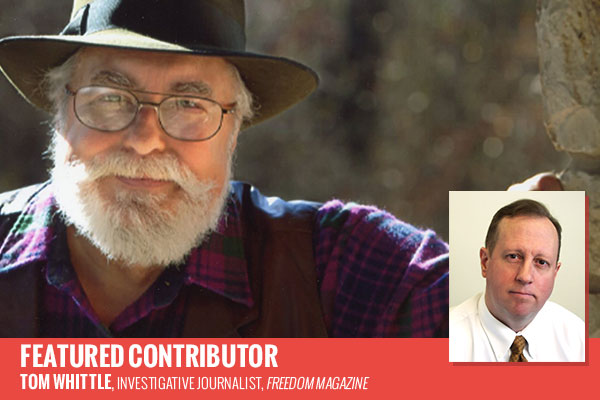
Jim Marrs: In Memoriam
- By Tom Whittle --
- 03 Oct 2017 --

Jim Marrs: Iconic Searcher for Truth
Jim Marrs made his home in the rolling hill country north of Springtown, Texas—where longhorns roam and where, on one excursion, I saw buffalo grazing.
With a journalistic background that included many years at the Fort Worth Star-Telegram, Jim went on to establish himself as an iconic searcher for truth through books that included several New York Times bestsellers, beginning with Crossfire: The Plot That Killed Kennedy.
When we first spoke in the mid-1980s, Freedom Magazine, published by the Church of Scientology, was providing a forum for a range of articles delving into unanswered questions about the assassination of President John F. Kennedy—a subject of abiding interest to Jim. We held enough in common to keep in touch regularly from that point on and, indeed, as time moved forward we became good friends.
As a journalist, Jim observed that many in the news media steered away from the fourth estate’s traditional watchdog role—particularly when it came to digging into certain controversial subjects.
He was never shy in that regard and his concern about his colleagues’ reticence caused media ethics to become a recurring theme in his work. In late 1986, at my request he furnished an in-depth article for Freedom that explored ethical implications of the purchase of ABC by Capital Cities Communications—a corporation in which then CIA Director William Casey was a major stockholder. Quoting an ABC News reporter who called Casey “our new boss,” Jim labeled the transaction “a dangerous and potentially destructive blow to freedom of the press.”
Crossfire, published in 1989, met with strong praise from an array of publications and critics. The Washington Post, for example, called it “compelling” while Kirkus described it as “A tour de force … that may be the final word until the year 2039—when government files on the case can be unlocked.”
With the release of Oliver Stone’s Academy Award-winning JFK in 1991, which drew heavily on Crossfire, Jim’s visibility grew.
In 1993, on the 25th anniversary of Freedom, I asked him to write a commentary for the magazine on the role of investigative reporting in restoring and maintaining freedom. His words are especially germane now: “Investigative reporting today faces challenges unknown in times past. It’s no longer enough to catch the local councilman on the take or the large polluting plant. The investigative reporter of today must take the world view of the multinational business and banking systems.
“Today’s reporter must transcend the media’s daily dose of soundbites, infobits and assorted data. He or she must view this daily barrage of information as pieces of a mosaic.”
He ended with these words (the ellipses are his):
“Look under the rock … never take the ‘official’ pronouncement at face value … always question authority—this is the creed of the true investigative journalist. It is the creed of a free people and one we should all embrace.”
That same year, Freedom presented Jim with its Human Rights Leadership Award at a ceremony in Los Angeles. An article in Freedom summarizing his achievements noted that “over the last three decades he has conducted a relentless and thorough investigation into the killing of President John F. Kennedy, interviewing eyewitnesses, government officials and many others connected to the story in order to bring the truth to the surface."
Although immersed in the often dangerous business of bringing truth to the world, Jim never let barriers or criticism faze him, slow him down, or undermine his sense of humor. Despite the gravity of subjects he researched, wrote and spoke about, he did so with sagacity, courage and wit.
He would chuckle about the tendency of media organizations to ignore important stories, instead sending hordes of reporters in pursuit of such things as the latest celebrity gossip, likening this massing of journalists to a bird common in the West: “It’s magpie journalism. They flock after stories like a bunch of magpies.”
In recent years, his books covered an array of investigative topics, but the great harm caused by mass use of psychopharmaceuticals constituted a powerful theme he returned to again and again. And as was his style, he looked for connections, reasons why things are the way they are, and who profits. In The Rise of the Fourth Reich, published in 2008, he wryly noted that the cross-corporate ownership of “pharmaceutical houses, medical institutions, and the mass media, combined with the extraordinary amount of pharmaceutical advertising, might explain the media’s hesitation in reporting the deleterious effects of drugs.”
Genuinely concerned about all aspects of freedom, he cared deeply about people as individuals. When I attended the wake held at his home on September 1, in the large gathering of friends and neighbors many spoke about how, despite his fame, he met with whoever came with questions or ideas, or who just wanted to talk.
At the wake, one could see, hear and even feel how Jim had touched and influenced many lives—these people who knew him best praised his openness, his honesty, his willingness to help, and more.
His legacy lives in his many books and the insights he shared, such as this from 2015’s Population Control:
“The twenty-four-hour, seven-days-a-week news channels leave the impression that the American audience is well informed. This is not true. Airtime is filled with such a constant stream of disconnected and unprobed reports that it paints a false, even grotesque picture of the world that herds viewers into conformity.…
“The challenge is to have mass media outlets offer thoughtful and meaningful information—not just what happened but placed into a context including the question of why something happened and who, if anyone, benefited….
“Better understanding of the realities of the world can be achieved by not just believing the status quo, but questioning it; looking for consistency in news reports; being wary of fearmongering and media-induced stereotypes; searching for explanations and questioning all authority.”


















